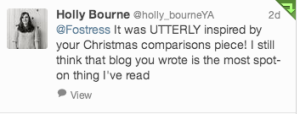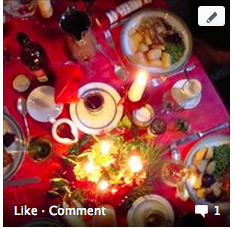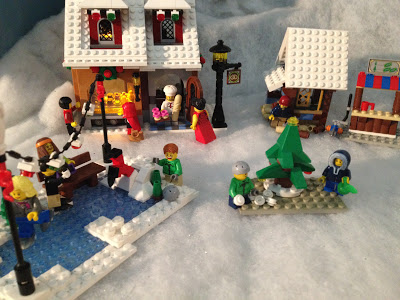- An article exploring how the media forces us to make damaging comparisons in the festive season – and how we often magnify the effect with our own social media activity.
- Internal comparisons
- The discrepancy monitor
- External comparisons in the festive season
- Media celebrations and comparisons
- Look my experience matches!
- This year, don’t let comparisons make you feel worse.
- Recognising that you’ve started making festive comparisons.
- Taking action to challenge comparisons
- Preventing the comparison spiral
- Have a realistic Christmas and an authentic New Year!
An article exploring how the media forces us to make damaging comparisons in the festive season – and how we often magnify the effect with our own social media activity.
A friend and old colleague Holly was recently published in the Vagenda. Her article was a spectacularly cynical but very funny piece called ‘How to be a Woman from Halloween to January 2nd’. It felt like it was making, in some ways, a similar point to my Christmas and comparisons article of last year. She was kind enough to say it was inspired by it – although they are very different styles. We’re definitely on a similar page as I recently reworked my  Christmas Comparisons article for ONE in FOUR to think about the whole of the wintery festive season we’re entering now. I also wanted to bring in the discrepancy monitor I recently explored in my social, media mindfulness and mental health piece. And here’s the new version;
Christmas Comparisons article for ONE in FOUR to think about the whole of the wintery festive season we’re entering now. I also wanted to bring in the discrepancy monitor I recently explored in my social, media mindfulness and mental health piece. And here’s the new version;
Internal comparisons
Do you have an internal picture in your mind of how your life ‘should’ be?
When you are feeling low do you ever find yourself judging your experience as ‘not right’ and comparing it to how you feel you ‘should’ be feeling or what ‘should’ be happening?
I mean thoughts like:
“Things should be different to this”
“I shouldn’t be feeling this way”
“I should be able to cope”
“I’m on holiday, I should be happy”
“Everyone else is out enjoying themselves and I’m not. What’s wrong with me?”
In managing my depression I often have to fight against my tendency to make judgements about how I feel my experience ‘should’ be. This doesn’t often happen consciously but takes place in the flow of automatic thoughts that run like a tape through my mind when I’m not really paying attention.
The discrepancy monitor
Segal, Williams and Teasdale (the creators of Mindfulness Based Cognitive Therapy) have a name for the part of our mind that makes comparisons like these. They call it the discrepancy monitor.
When we’re trying to get practical things done the discrepancy monitor can be helpful. We look at what the situation is now (the kitchen is a mess) and how we’d like the situation to be (I’d like a tidy kitchen) and then we decide what should be done to get to the preferred outcome (tidy up).
The problem comes when the discrepancy monitor kicks in inappropriately and tries to get involved in solving the ‘problem’ of our feelings, moods and who we feel we are as a person. Trying to ‘solve’ emotions intellectually doesn’t often work.
Making comparisons between how we feel and how we’d think we ‘should’ feel is an unpleasant experience. It is made worse by the fact that these thoughts can (often without us really noticing) lead to further negative, judgemental thoughts about yourself, the world and the future. This leads to a downwards spiral into a low mood. And because the discrepancy monitor is working overtime monitoring the situation, it brings your attention to the ever-widening gap between how you feel and how you think you ‘should’ feel. You end up feeling terrible and you’re not even sure why.
“I feel tired this morning”
“This is a really rubbish thing to be feeling”
“I feel low about feeling tired”
“I shouldn’t be feeling low, everyone else is happy”
“What’s wrong with me that makes me feel this way?”
“Why can’t I ever just be happy?”
“Nothing is ever going to change”
What if you were able to catch yourself and stop yourself making those initial comparisons? Instead of this downwards spiral making your negative mood more deeply entrenched, what if you could be more accepting towards your initial tiredness or low mood? Instead you could try taking a different and positive action that you know you gain pleasure from – or just wait for the experience to pass. Segal, Williams and Teasdale call this changing mental gear into a ‘being’ rather than ‘doing’ mode.
External comparisons in the festive season
This automatic comparison is something that I do by myself, without external pressure. People who’ve had depression have a tendency for it.

But there’s more fuel for making comparisons these days than there has ever been before. Now we also have the projected experience of others to contend with. Social media, particularly Facebook, gives people an opportunity to project outwards the version of their life that most closely fits their ‘ideal’. As well as having an internal image of how our lives ‘should’ be that we constantly and automatically compare to our actual experiences, we’ve got an external (although probably equally unrealistic) image of how everyone else’s lives are. And from this point, the negative spiral of judgement to internal recrimination to anger, frustration and misery can be the same.
It struck me that the festive and holiday season might be a time when even people who don’t usually suffer from depression are much more at risk of the negative spiral that can be triggered by making comparisons.
Media celebrations and comparisons
Just look at the way the media, the shops and the advertising companies celebrate. It might be Halloween, Bonfire Night, Thanksgiving or, the worst culprit, Christmas. We are bombarded with images and ideas about what the perfect celebration should be. As far at the media is concerned, no one is lonely, no families fight and everyone is cosily wrapped up in warm woollen knits. The most untoward thing that might happen is a teenager won’t wear his Christmas hat, the toffee apples get stuck to the tray or a mother gets flustered over the turkey. Never mind though, everything is almost instantly resolved with a hug and a rueful look.
Day in day out over this period we are almost forced to make that comparison between our lives and feelings and what we’re being told they ‘should’ be.
Look my experience matches!
And we often respond by trying to create that experience and sharing our creations on social  media. This makes us feel better. This picture of me in a woolly scarf drinking mulled wine matches how things ‘should be’. Look, my experiences matches! This in turn just feeds the external pressure that others are feeling. As a society, we’ve created a story told through our television screens, shop windows and advertising and kept fed through our own attempts to recreate it on social media.
media. This makes us feel better. This picture of me in a woolly scarf drinking mulled wine matches how things ‘should be’. Look, my experiences matches! This in turn just feeds the external pressure that others are feeling. As a society, we’ve created a story told through our television screens, shop windows and advertising and kept fed through our own attempts to recreate it on social media.
But in fact, things are not that way. Experiences in these couple of months are as varied as there are people. No one experiences the ‘media’ Christmas or the perfect autumnal Bonfire Night of the adverts and clothing catalogues. Things always fall short of that because that version of the world doesn’t exist. We are being forced to measure our experiences against something fake. And when they fall short, we can easily make ourselves feel worse by allowing that negative spiral of thoughts and judgements to get in. And as a result it can become a more difficult and more challenging time.
This year, don’t let comparisons make you feel worse.
This year, have a real festive season. It might not be great, it might be mainly a lot of fun or it might be totally rubbish. However it goes don’t make it worse by getting sucked in to comparisons.
So what can you do?
Recognising that you’ve started making festive comparisons.
One of the most important things is recognising when you make these automatic comparisons. Writing them down as they come up can help you to view them as intrusive thoughts rather than reality. Recognise that it’s a fantasy world being created and try to identify everything that is feeding into it.
If you find yourself scanning Facebook and feeling jealous or inadequate then you’re making comparisons and are at risk of that negative spiral. Remember that those people are representing their lives – in the same way that the media tells us the story of how we should be experiencing the season. They too might be feeling the pressure. We don’t know what is behind the pictures.

Adverts in particular are very insidious and a sense of how things ‘should’ be can sneak its way into your brain however hard you are trying. Next time you see one of these adverts imagine them all made of Lego, or drawn in watercolours. This way it’s easier to recognise that they’re telling a lovely story, but that’s all it is, a story. Not seeing them as real humans can help prevent us from making these comparisons.
Taking action to challenge comparisons
Recognising that you have started making comparisons and if you don’t stop they are going to make you feel low is a big step in itself. If you notice them taking hold, challenge them. Create yourself a mantra – “I’m not going to let myself get sucked into this comparison game again, I’m comparing my experience to something that doesn’t exist”. Instead, be gentle with yourself. Make yourself a list of things that give you pleasure, however small, and do one of those if you find yourself feeling low. Distracting your mind can prevent it from spiralling down.
Mindfulness tells us to take a ‘breathing space’ to stop that damaging thinking and refocus your awareness on the here and now.
Preventing the comparison spiral
This isn’t always easy, but there are things that can help you to keep a clearer head. Everyone has to manage their own relationship with alcohol, hormones, food and sleep – but at least recognising their influence can help you regain control of that mind spiral. This is especially important at this time of year when there might be more alcohol, unhealthy food and less sleep around.
Finally, if you recognise yourself in some of the above experiences, it might be worth checking out Mindfulness properly. You can do an online Mindfulness course at bemindful.co.uk.
Have a realistic Christmas and an authentic New Year!
This winter enjoy any good moments and when you find things difficult, move away from making comparisons and be gentle with yourself. Try not to make it worse by letting yourself get sucked into comparing your experience with a fantasy. But don’t be too hard on yourself if sometimes you can’t help it. Comparisons are just thoughts and they’ll pass out of your brain like storm clouds from a sky if you don’t focus too hard on them.




1 thought on “Festive comparisons and the Facebook effect”